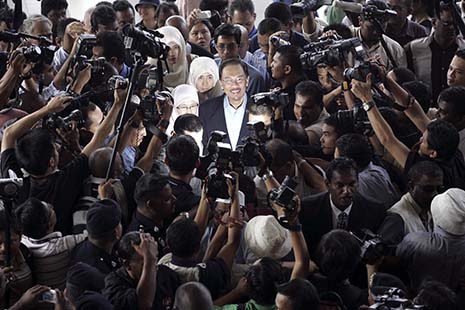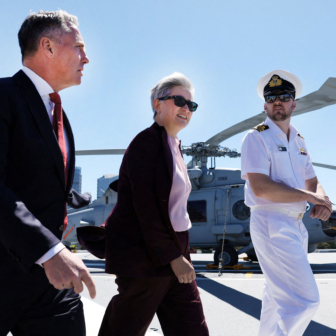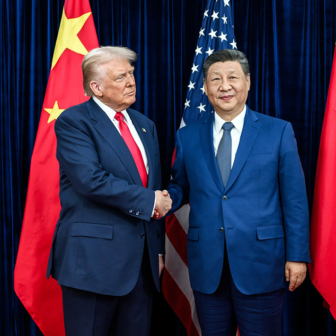“LIWAT, LIWAT” (“Sodomy, sodomy”) came the cries, rising above the hubbub of chants, cheers, jeers and boos, the din of workday traffic and the ominous chuntering of the police helicopter overhead. Under cloudy skies early on a sultry morning in August, thousands had gathered in northern Malaysia in one of those outbursts of political frenzy characteristic of life in this nominally democratic country, where politics is everyday business and, some say, business just politics under a different name.
A heavy police presence was on hand as the crowds of government and opposition supporters converged at an election centre. One side waved flags and banners in the blue-and-white of the ruling Barisan Nasional (National Front) coalition and the red-and-white of the United Malays National Organisation, or Umno, which dominates it. A scattering of ethnic Chinese and Indian supporters from other Barisan Nasional parties were on hand but it was a mostly Malay crowd, with groups of young women wearing traditional dress in Umno colours, sporting fashionable handbags and expensive mobile phones. But much of the activity lay across the field in a much bigger crowd with more enthusiasm, hope and optimism. These were supporters of the opposition alliance, bringing together a varied group ranging from ethnic Malays in Islamist robe, beard and skullcap or traditional dress mingling with ethnic Chinese and Indians of different religious and political persuasions in casual slacks and t-shirts.
In the midst of all this two young Malay men stepped forward from the Umno lines, taunting opposition supporters by simulating gay sex, to uproarious laughter and amused titters from the young men and women behind them. “Liwat, liwat” they shouted, temporarily silencing the opposition phalanx. Not for long. “Mongolia, Mongolia” came the reply. Not your usual party slogans, but these were unusual times. Even to displaced Malaysians like myself, watching at a distance from Canberra via shaky bloggers’ videos on the Internet, it was a strange piece of political theatre.
It is no longer business as usual for Malaysian politics. In semi-rural Permatang Pauh, hometown of opposition leader Anwar Ibrahim – at whom the barb of “liwat” was aimed – factories have crowded out rice fields, although fighter planes still routinely take off from a nearby air base where the RAAF rotates a squadron of fighter-bombers. Across the channel lies George Town on the island of Penang, where electronics factories and beach resorts have replaced an entrepot trade two centuries old as the centre of the economy. There, just five months earlier, Lim Guan Eng, leader of the Chinese-dominated, leftist secular Democratic Action Party had become chief minister. In rural Kedah, Malaysia’s rice bowl, another new administration is led by the largely Malay Islamist party, Parti Agama Se-Malaysia. In nearby Perak, where 60 per cent of the world’s tin was once mined, the Democratic Action Party is the senior party in an opposition alliance. Further south, in rich, industrialised Selangor, Anwar Ibrahim’s own Parti Keadilan Rakyat (People’s Justice Party) is dominant. The north and centre of the Malaysian peninsula, the heart of its commercial and industrial base, are in opposition hands. But the timber, petroleum and gas-rich states of Terengganu, Sabah and Sarawak have held firm for the Barisan Nasional, providing a comfortable parliamentary majority.
At Permatang Pauh that morning, all the elements of Malaysia’s heady political cocktail of ethnicity, religion, class, creed and greed were bound up in that crowd, that setting, as the candidates prepared for a by-election in which Anwar sought his parliamentary comeback. It had been ten years since he was sacked by then prime minister Mahathir Mohamad and jailed for six year on sodomy and corruption charges, which many saw as a conspiracy to remove him from power. And the counter-chants of “Mongolia” were a reference to a sensational murder case involving a pretty young Mongolian translator and a close associate of defence minister Najib Tun Razak, a case that gripped and angered many Malaysians with its mix of government power and personal revenge.
The noisy showdown in Permatang Pauh illustrates the current divide in Malay – and Malaysian – politics while the country waits to see what direction its future will take. As much depends on Umno’s continuing internal power struggle leading up to party elections in March 2009 as it does on the contest between the two coalitions. Malaysia finally has a two-party parliament after fifty years of uninterrupted Umno-dominated rule and Anwar and his unlikely allies seemed on the cusp of forming the government themselves. But Anwar’s self-imposed September deadline has passed without any sign of the promised thirty-one Barisan Nasional defections he needed to take power. In the meantime Umno's power play, with high stakes for both Mahathir and outgoing prime minister Abdullah Ahmad Badawi, leaves the country held hostage to the Malay elites.
The opposition’s electoral gains provided ammunition to hardline conservatives in the government and Umno who were upset by Abdullah’s cautious reforms. Prominent among these is former PM Mahathir, whose son Mukhriz is now the front-runner to lead the party’s youth wing and thus in a prime position to bolster his father’s position. Abdullah’s slackening of tight political control and his very cautious attempts at reforms had already put Mahathir in jeopardy of prosecution for judicial interference. The opposition was pushing hard and could overturn the Umno gravy train, which had squandered billions in Mahathir’s time. Undermined by Mahathir and his allies, Abdullah was forced to take himself out of contention for re-election as party leader, clearing the way for his deputy Najib Tun Razak. Najib is a scion of the ruling classes; his father, Tun Abdul Razak, was the prime minister whose administration created many of the policies and systems that now haunt and divide Malaysian society.
With a mainstream media completely controlled by the government, Malaysians have turned overwhelmingly to the internet for alternative news sources. Many accounts, most notably by blogger Raja Petra Kamaruddin, have linked Najib to arms deals. Malaysia has spent billions during his fourteen years as defence minister buying fighter jets, ships, tanks and weapons. Bloggers have also linked Najib and his wife to the gruesome murder of Mongolian translator Altantuya Shaariibuu, a 28-year-old who was said to be working on negotiations to buy French submarines for Malaysia. Shaariibuu was shot dead and her body blown up with military explosives after an affair with Najib’s close associate, Abdul Razak Baginda. Razak has been cleared of abetting murder, but two of Najib’s bodyguards remain on trial. After the revelations Raja Petra, the blogger, was himself detained under the harsh Internal Security Act, a law now regularly used against government critics, Islamic “deviants” and drug smugglers. He was freed last week in a rare instance of the judiciary acting independently and upholding his application for habeas corpus. But his freedom will not go unmarked by the hardline elite.
To entrench themselves, the hardliners have vociferously revived the agenda of Malay supremacy. Malaysia is culturally heterogeneous and just as equally politically divided; deep fissures of ethnicity, culture, language and class overshadow any meaningful discourse of political ideology. The divides are quickly revealed not just in casual attitudes – don’t let your children marry outside your race; Malays will riot if they have to give up power – but in entrenched government policies giving Malays a head start in everything from buying a home or shares, to having children, climbing the public service ranks, and doing business. A constitutional provision for ten years of Malay special privileges after independence has evolved into “Ketuanan Melayu,” a chauvinistic concept of Malay domination. The special privileges are now entrenched and put beyond legal challenge – in perpetuity, many fear. The policy has become a convenient wedge that Umno wields to retain the power by which its elites and their allies enrich themselves. It is also an indoctrination tool the organisation uses to keep the rural heartland.
No one in the country is untouched by these policies or by the Barisan Nasional’s fear tactics, which have now spanned two generations. I and most of my friends grew up in the shadow of Mahathir, who ruled for twenty-two years. The Malaysia I grew up in was one in which groups of friends could go out to a late night movie at a slick new cineplex and have an even later dinner under a tree at a cheap and cheerful hawker stall by the roadside. It was a country where you could speak English at home, Malay at school and a Chinese dialect (badly) at the food markets. But whichever language you spoke, it was always understood that you should be careful whom you shared your opinions with. And if you were out to dinner at that cheerful hawker stall with more than four of your best friends, you knew you were technically breaking the law against “public gatherings.”
The system, which divided us into Malays and non-Malays, dictated all our lives. University admissions quotas that favoured Malays over ethnic minorities left us with little choice but to get an expensive education either overseas or at private institutions. The low academic standards engendered by the quota system also gave impetus for our exodus. For many of my non-Malay friends there was constant pressure to do well because they were starting at a racial disadvantage. But – in an ironic twist – the business skills and education they received helped give them confidence to take a chance on the opposition parties at the polls in March this year.
With so much at stake, the current hiatus in Malaysian politics cannot last and will not be quiet. The larger battles to come may be between Najib and Anwar, but there is plenty to keep Mahathir and Abdullah active on the sidelines. And yet again, for those in the cultural minorities, it will be occasion to seek shelter, for “when elephants dance, the grass gets trampled”; this time, the new strength of the opposition alliance may provide a buffer. Najib, a smooth operator with a law degree from Nottingham, is still remembered in many minds for waving a traditional knife at a party conference in 1997, threatening to bathe it in blood. Many of my generation forced by the admissions quota to study at private colleges can recall how he threatened to place ethnic admissions quotas on those schools as well. And they remember when another minister pathetically explained there was no money to equip schools with computers when billions were going on arms and mega-projects at great profit to cronies.
Anwar and his allies have presented themselves as the proponents of a non-race-based political system but he has many challenges to overcome, not least another trial on sodomy charges. The new crowd of MPs, many of them young first-timers, could spread themselves thin by chasing after everything from reforming parliament to bringing down food and grocery prices. They risk losing the new-found trust of Malaysian voters if they cannot – somehow – show that they are capable of undoing fifty years of corruption and nepotism. It’s a tall order. But the millions of ordinary people like my friends have little choice but to place their trust and hopes in the few voices of reason against the chorus of racism, privilege and greed – and pray that an enfeebled and corrupted system can still deliver. •




